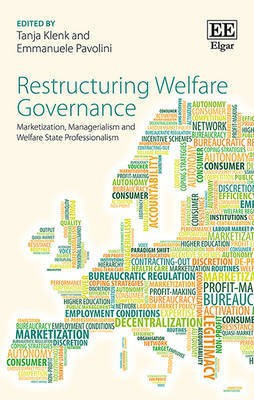Restructuring Welfare Governance(English, Hardcover, unknown)
Quick Overview
Product Price Comparison
This volume brings together cutting-edge scholarship on an under-researched and topical issue. Quasi-marketization and managerialization of welfare organizations are found to constitute common reform trends in many European countries and across social policy domains, following similar timings albeit with different intensities. The analysis, carried out at the meso and micro levels, reveals that ex-post control by states has been strengthened, managers are becoming relevant or even central actors, while professionals in public welfare institutions are seeing their role and autonomy challenged.' - Ana M. Guillen, University of Oviedo, Spain 'In the contemporary welfare state public management has become a profession of its own. At the same time professionals in public welfare bureaucracies have incorporated market considerations and managerial objectives in their daily work. This current evolution of welfare governance, path dependent as it is, has been documented thoroughly in this book, both in depth and from a comparative perspective. It makes the book a must read for all who are interested in the welfare state and care about its future.' - Peter Hupe, Erasmus University Rotterdam, the Netherlands 'This edited collection on welfare governance across Europe will prove itself invaluable for research and teaching purposes. It usefully brings together the whole range of social sciences in a series of well organized, evidenced and argued chapters. The book is organized into two parts, the first focusing on the impact of marketization and managerialization across Europe and across sectors within the welfare state, while the second half focuses on the professions and the emerging human resource management issues. Both are crucial aspects of the new governance and together deliver a coherent and comprehensive set of papers addressing a highly pertinent set of questions for policymakers, analysts and managers for the next decade and will become recommended reading for the students, the welfare state, social and health policy as well as public sector management and administration.' - Mike Dent, Staffordshire University, UK Quasi-markets and managerial steering techniques have spread in the provision of welfare state services and are now a salient feature. This innovative book explores the introduction and impact of marketization and managerialism in social policy by adopting a dual perspective - one on regulation and governance, the other on human resources - covering five fields of social service delivery. Welfare governance (for example, welfare mix, regulation, employment conditions and customer involvement) has changed significantly in the past decade. In particular, the new governance models not only clash with traditional ideas of bureaucratic regulation but also with the norms and standards of professional service delivery. The fact that the labor force in welfare organizations is made up of 'professionals' implies that the introduction of new modes of welfare governance often results in organizational conflicts. The editors and contributors collectively assesses these processes not only by comparing different policy fields and countries, but also by taking a close look inside organizations, examining the coping strategies of professionals, and how they adapt to new models of governing welfare organizations. An ideal compliment to undergraduate and postgraduate study, Restructuring Welfare Governance is essential reading for scholars in the fields of social policy, public administration and comparative welfare state analysis. Contributors: K. Baadsgaard, V. Burau, F.A. Ceravolo, B. Jantz, H. Jorgensen, T. Klenk, E. Kuhlmann, R. Moscati, M. Noordegraaf, I. Norup, E. Pavolini, T. Peetz, M. Rostan, U. Schimank, A. Stanchi, C. Teelken, H. Theobald, M. Thunnissen, M. Turri


